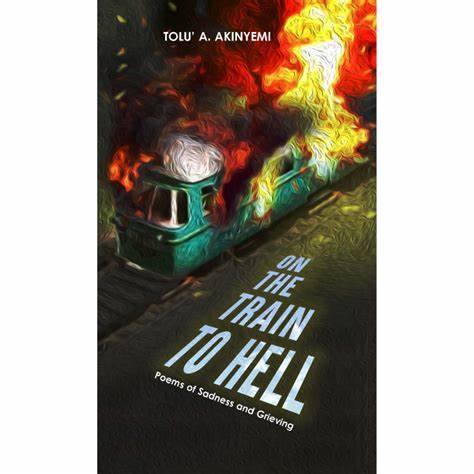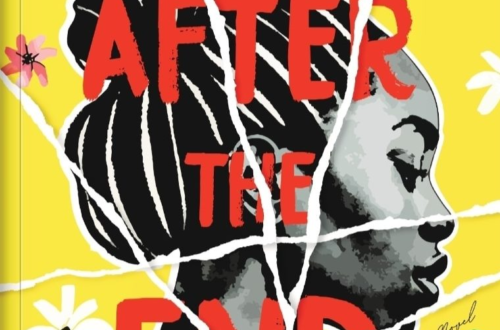Reviewer : Taiwo Michael Oloyede
When sorrows come, they come not in single spies, but in battalions.
-Williams Shakespeare
In, On The Train To Hell, Tolu A’ Akinyemi writes gravely about diurnal issues of life that is common to man ; macerating us in the rigour of his storytelling adeptness, suffused in grainy elocutions. From the title of the book, we ram through the inflorescence of poignant narratives from the first page and weave in between surreal verses to the core of his renderings. In the opening poem, dust to dust, we come in contact with the rinds of grief and its burning effect. The persona in the poem expresses a deep shock at the loss of some eminent people and kept wailing about the cruelty of death as enthused lines like… colder than ice/ we wear our pain until our hearts become a sorrow bed… In this book, Tolu made an attempt to chauffeur us to the shrine of grief and lay bare our fears, musings and galoshes of agony by its doorstep; rapping the gates of sadness in an uncanny reel of illustrations. He queries the happenings in his country and other grievous happenings around the globe. If we asked anyone about grief; we are most likely to be met with silence, more silence, a long heave of sigh and gesticulations of sentences that could morph into an unbridled stream of tears. Rumi, in one of his poems, said that grief is a guest that comes to clear us for new delight. But people have different ways of tempering grieve. For some people, grief is a station where they ground to a numbing halt; and for some, grief is a scourge for reflection and for some others, grief and sadness are a refiner’s fire that will rid them of the dross of superfluities. There are so many other dialectics about grief nursed by both scholars and everyday people. Two influential philosophers who reflected on these issues were Zhuang Zhou and Confucius. Zhuang Zhou lived in the fourth century B.C. and is credited with writing one of the most important texts of the Daoist philosophy, “Zhuangzi.” Confucius, who lived more than a century before Zhuang Zhou, had his teachings collected in a text written by later students, commonly known in the West as the “Analects of Confucius.” In one story, Zhuang Zhou’s friend Hui Shi meets him just after Zhuang Zhou’s wife of many years has died. He finds Zhuang Zhou singing joyously and beating on a drum. Hui Shi upbraids him and says:
“This person lived with you for many years, and grew old and died. To fail to shed tears is bad enough, but to also beat on drums and sing – is this not inappropriate?”
Zhuang Zhou replies that when his wife first died, he was as upset at her loss. But then he reflected on the circumstances of her roots – how she came to be through changes in the elements that make up the cosmos. He was able to shift his vision from seeing things from the narrowly human perspective to seeing them from the larger perspective of the world itself. He realized that her death was just another of the changes of the myriad things constantly taking place in the world. Just as the seasons progress, human life generates and decays.In reflecting on life in this way, Zhuang Zhou’s grief vanished. But for Confucius, though, the pain of grief was a natural and essential part of human life. It demonstrates commitment to those for whom we grieve. Confucius had even legislated a three year term for mourning one’s loss, at least. But we know it is quite impossible to lesgilate how people should grief; especially in these interesting times that GenZ’s found it ‘woke’ to throw parties following the wake-keep of a reality TV star. The blue app had motley opinions for such an unconscientious act. Even animals know there is a time for everything, let alone humans, with blood beneath their nails.
Grief being the central motif in Tolu’s collection of poems, has made this book a referral file for cases and issues that draw parralels from this work, in other to capture the flighpath of esconcing grief. In the titular poem, On The Train To Hell, the persona in the poem laments about someone lost to the whims and calumny of terrorists in a crime besotted nation. He cries about all the prayers said, to ensure the lost one did not die in the throes of the nations’s tryst with terroism. But at last, the lost-one became a victim sent to heaven in an angelic regalia. The persona uses train as a metaphor for driving a soul that is just exiting hell to another hell. The persona in the poem finds it counterintuitive and heartbreaking as seen in the last line of the poem…your gruesome demise on the burning train was a bitter pill to swallow. In the poem, mountain of fire, the persona lampoons about roasting imaginary spirits in a lake of fire. The poem unearths the shenanigans of sanctimonious and over duely righteous folks in a fit of performative exorcism in attempt to cast and bind spirits and ship them back to their place of origin.The persona in the poem attempts to tickle us to hilarity with his nuances and joggling of words about the frenetic mode of the spirits and their undulant dash from acidic prayers. In the poem, Eerie Silence, Tolu turned thought to the prevalent issues of religious bigotry in his country and decried how a girl was lynched to death for pelting purported blasphemous words at a deified personailty. It is quite depressing to see a young woman burn to ashes in a supposed learning environment where she had gone to be nurtured and taught civility. And the media was fraught with perorations and fawned over the issues.The persona in the poem expressed grief in lines like… your selective amnesia spoke volumes /in the news room/morality was exiled. In the last poem,I no longer have a home, the personal wails about not having a partner and begs for some sort of comfort in the grip of a lass so he could craft himself a shelter in her lair.
This collection speaks to grief and to other issues of desire, bigotry, fetishm, banditry, conspiracy and corruption. Tolu rendered his lines with fastened iterations and lurid evocations. This collection of poignant poems would punch nimble lids to bleed.
Oloyede Michael Taiwo is a cultural activist, art critic, playwright, management consultant, multisensory artiste, actor, producer, performance artiste, art curator. He had a cameo appearance in the Netflix chart buster, Collission Course. His works have appeared in Ake review, headlined by the Abdulrazak Gurnah( Nobel Prize for Literature Winner,2021), Kirkus reviews, Praires Review, thelagosreview, TheGuardian, Vanguard, BusinessDay, TheGhanareviews and many other literary papers.
A Fellow of the Institute of management consultants. His play, wrinkles , dimples, naira and bets, was on stage at the Lagos theatre Festival, 2020, supported by the British Council. His debut novel, Colourless rainbow, is due for publication in 2023. His debut collection of poems, Lagos is killing me, has been reviewed to critical acclaim and is still raking rave reviews across the globe. He resides in UK; massively affecting the cultural landscape with his infectious storytelling acuity, poetic nuances while trucking people into the haven of emotional hygience with his charismatic and disticnt style of evocation and artistic sophistry. He is the curator of the premier round the clock poetry event in West Africa; Lagos Poetrython and the Lagos Poetrython Spoken Word Academy which has affected cultural talents in thousands. He loves to comb the liminal space with the riff of guitar strings, chafe of konga drums, and psalms recitations.





